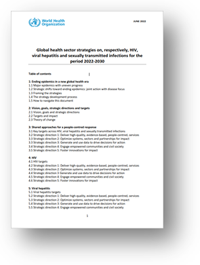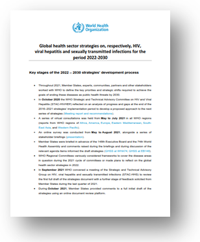Final global health sector strategies on respectively, HIV, viral hepatitis and sexually transmitted infections, 2022-2030
The Seventy-Fifth World Health Assembly noted with appreciation the new Global Health Sector Strategies on, respectively, HIV, viral hepatitis and sexually transmitted infections for the period 2022-2030 (GHSS) and approved its implementation for the next 8 years.
The new strategies propose a common vision to end epidemics and advance universal health coverage, primary health care and health security in a world where all people have access to high-quality, evidence-based and people-centred health services. The GHSS promote the disease-specific goals to end AIDS and the epidemics of viral hepatitis and sexually transmitted infections by 2030, with 5 strategic directions providing the overall guiding framework for achieving these goals. More details on the 2022-2030 GHSS
WHO is looking forward to implementing the core elements of these strategies with all Member States, experts, communities, partners and other stakeholders for ending these diseases.
Final strategies
Key stages of the strategies’ development process
The global health sector strategies were developed through a broadly consultative and largely virtual, process. Member States, experts, communities, partners and other stakeholders worked with WHO to define the key priorities and strategic shifts required to achieve the goals of ending these diseases as public health threats by 2030.
Download full information on the GHSS 2022-2030 development process (PDF, 295 KB)


